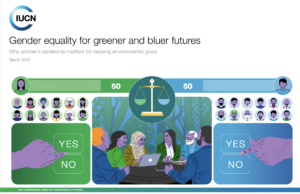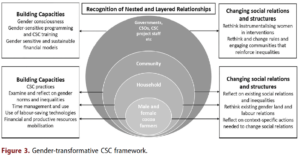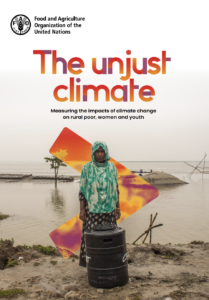In September 2018, the REDD+ Programme in Cambodia commissioned this assessment with the overall objective to support the RGC’s inter-ministerial Gender Group’s efforts to mainstream gender into REDD+ Action and Investment Plan. The specific objectives were to: 1) Assess to what extent gender considerations are addressed within strategic documents, action plans and reports related to the REDD+ programme in Cambodia and identify any good practices on gender undertaken and and/or lessons learned, which can be used to help inform the National REDD+ Action and Investment Plan; 2) Through field surveys, identify any gender gaps in REDD+ implementation (e.g. in REDD+ demonstration project sites); 3) Identify entry points for mainstreaming gender within the National REDD+ Action and Investment Plan; and 4) Provide recommendations on how to make the National REDD+ Action and Investment Plan gender-responsive.
Recommendations
a) Overarching Recommendations for National REDD+ Action and Investment Plan/NPASMP/PFSP
• The MoE and REDD+ Taskforce Secretariat can work with the REDD+ Gender Group, MoWA and with other relevant institutions to develop a common working gender strategy that can be easily embedded in the NRS-AIP and PA and PF management plans. The working strategy could be based on the findings and recommendations of this report on “Mainstreaming Gender into Cambodia’s REDD+ Action and Investment Plan.”
• Strengthen the national level REDD+ Gender Group to guide and support the MoE, MAFF’s technical staffs and stakeholders at national and subnational levels to integrate gender. Gender Group could be strengthened with formal mandates and ToRs and adequate financial resources to facilitate and guide the implementation of the NRS-AIP.
• Create/strengthen Gender Groups at subnational level to support REDD+ planning and monitoring from gender perspectives to ensure gender equality. Sector-wise gender groups could be designated with clear ToRs on gender and social inclusion in national REDD+ action.
• Create or strengthen informal network of local resource persons at the district and commune levels. A pool of local resource persons (LRPs) from the government and NGOs with skills on gender and social inclusion and participatory approaches together with technical skills can support women’s participation and access to REDD+ and forest management related resources.
• Support the formation of community level women’s groups or platforms to ensure their participation and to recognize them as key stakeholders in REDD+ and forest management. Pilot the formation of women’s groups in selected PAs and PFs and use the experiences to scale-up in the next
phases.
• Develop a capacity development package to enhance gender integration. The package should be integrated with the REDD+ related technical capacity building component. It should include training on analytical capacities, methods and tools for gender and social inclusion, including topics, such as gender and social analysis, gender integration, organizational assessment from gender perspective, leadership, etc.
• Support the Monitoring Information System (MIS) of REDD+ and forest institutions in establishing a monitoring system that captures gendered outcomes (immediate and intermediate levels).
• Generate and share knowledge on gender integration. Gender-related challenges and learning should be fed back into the planning process, and disseminated through publications and other knowledge-sharing events at national and community levels. For example by developing a knowledge management strategic plan on gender and REDD+ which can be tied to MoE’s and MAFF’s existing knowledge management/ communication plans and efforts, as well as to monitoring and evaluation processes or functions.
b) Specific Recommended Actions for National REDD+ Action and Investment Plan/ NPASMP/PFSM
• Support the integration of gender in the preparation of the PA Management Plans, in the revision of the Law on Forestry and National Forest Programme, and in the establishment of new PAs (e.g. Wetland PAs and Coastal/Marine PAs).
• Support integration of gender in the development of the three Regional Training Centers for PA management and in their technical training modules for central and subnational staffs.
• Develop a provision for at least 30% for women and marginalized groups to participate in key regional and international workshops; trainings and study tours, in National Committee for Conflict Resolution on PA Management; and in these Forestry inventory team.
• Support women’s participation in collaborative efforts to monitor and control unauthorized activities in forest areas, and involve them in forest rehabilitation, restoration programmes and other forest technical activities through investment in formation of women’s groups, technical training; social, gender analysis and leadership training and coaching and mentoring; providing equipment etc.
• Promote and support alternative energy technologies that reduce poor women’s household and farm workloads, allowing them to participate regularly in the REDD+ and forest management activities.
• Assess the capacity needs of the key implementing PA and PF related staff and stakeholders, particularly at subnational levels from gender perspectives. Ensure educational outreach/awareness programmes and trainings are gender-responsive and delivered using participatory tools and methods to increase women and marginalized groups participation in forest and ecosystem restoration/management.
• Expand livelihood opportunities for women and marginalized groups by provisioning targeted resources and budget. For example design and pilot Win-Win development for conservation initiatives, such as ecotourism packages for marginalized women (homestays) and support gender integration in the development of the proposed Ecotourism Strategy for the PAs.
• Review the three forest institutions mandates (FA, PA, FiA) from gender perspectives to include gender integration as their roles and responsibilities.
• Improve coordination and collaboration for research, forestry education, resource planning and policy development to increase women’s meaningful participation as well as their access to forestry and REDD+ related resources.
Author: Dibya Devi Gurung, WOCAN Core Associate



